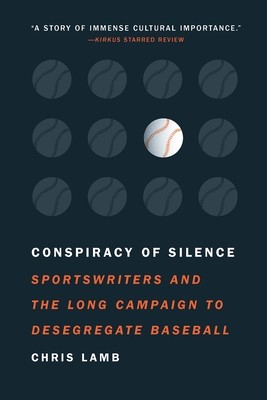
- We will send in 10–14 business days.
- Author: Chris Lamb
- Publisher: University of Nebraska Press
- ISBN-10: 1496229371
- ISBN-13: 9781496229373
- Format: 15.2 x 22.9 x 2.4 cm, minkšti viršeliai
- Language: English
- SAVE -10% with code: EXTRA
Reviews
Description
Named a top 50 baseball book of all time by the Huffington PostNamed 2013 Best Book on Journalism and Mass Communication History by the Association of Education in Journalism and Mass Communication
Named a top book for 2012 by Choice The campaign to desegregate baseball was one of the most important civil rights stories of the 1930s and 1940s. But most of white America knew nothing about this story because mainstream newspapers said little about the color line and still less about the efforts to end it. Even today, as far as most Americans know, the integration of baseball revolved around Branch Rickey's signing of Jackie Robinson to the Brooklyn Dodgers' organization in 1945. This book shows how Rickey's move, critical as it may have been, came after more than a decade of work by Black and left-leaning journalists to desegregate the game. Drawing on hundreds of newspaper articles and interviews with journalists, Chris Lamb reveals how differently Black and white newspapers, and Black and white America, viewed racial equality. Between 1933 and 1945, Black newspapers and the communist Daily Worker published hundreds of articles and editorials calling for an end to baseball's color line, while white mainstream sportswriters perpetuated the color line by participating in what their Black counterparts called a "conspiracy of silence." The alternative presses' efforts to end baseball's color line, chronicled for the first time in Conspiracy of Silence, constitute one of the great untold stories of baseball--and the civil rights movement.
EXTRA 10 % discount with code: EXTRA
The promotion ends in 23d.10:00:17
The discount code is valid when purchasing from 10 €. Discounts do not stack.
- Author: Chris Lamb
- Publisher: University of Nebraska Press
- ISBN-10: 1496229371
- ISBN-13: 9781496229373
- Format: 15.2 x 22.9 x 2.4 cm, minkšti viršeliai
- Language: English English
Named 2013 Best Book on Journalism and Mass Communication History by the Association of Education in Journalism and Mass Communication
Named a top book for 2012 by Choice The campaign to desegregate baseball was one of the most important civil rights stories of the 1930s and 1940s. But most of white America knew nothing about this story because mainstream newspapers said little about the color line and still less about the efforts to end it. Even today, as far as most Americans know, the integration of baseball revolved around Branch Rickey's signing of Jackie Robinson to the Brooklyn Dodgers' organization in 1945. This book shows how Rickey's move, critical as it may have been, came after more than a decade of work by Black and left-leaning journalists to desegregate the game. Drawing on hundreds of newspaper articles and interviews with journalists, Chris Lamb reveals how differently Black and white newspapers, and Black and white America, viewed racial equality. Between 1933 and 1945, Black newspapers and the communist Daily Worker published hundreds of articles and editorials calling for an end to baseball's color line, while white mainstream sportswriters perpetuated the color line by participating in what their Black counterparts called a "conspiracy of silence." The alternative presses' efforts to end baseball's color line, chronicled for the first time in Conspiracy of Silence, constitute one of the great untold stories of baseball--and the civil rights movement.


Reviews